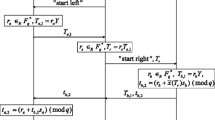Abstract
Medication error can easily cause serious health damage to inpatients in hospital. Consequently, the whole society has to spend huge amount of extra resources for additional therapies and medication on those affected inpatients. In order to prevent medication errors, secure inpatient medication administration system is required in a hospital. Using RFID technology, such administration system provides automated medication verification for inpatient’s medicine doses and generates corresponding medication evidence, which may be audited later for medical dispute. Recently, Peris-Lopez et al. (Int. J. Med. Inform., 2011) proposed an IS-RFID system to enhance inpatient medication safety. Nevertheless, IS-RFID system does not detect the denial of proof attack efficiently and the generated medication evidence cannot defend against counterfeit evidence generated from the hospital. That is, the hospital possesses enough privilege from the design of IS-RFID system to modify generated medication evidence whenever it is necessary. Hence, we design two lightweight RFID-based solutions for secure inpatient medication administration, one for online verification environment and the other for offline validation situation, to achieve system security on evidence generation and provide early detection on denial of proof attack.



Similar content being viewed by others
References
National Coordinating Council for Medication Error Reporting and Prevention, What is a Medication Error? Retrieved from http://www.nccmerp.org/aboutMedErrors.html.
Institute of Medicine of the National Academies, Preventing medication errors: Quality chasm series. The National Academies Press, Washington, 2007.
National Coordinating Council for Medication Error Reporting and Prevention, Recommendations to Enhance Accuracy of Administration of Medications. Retrieved from http://www.nccmerp.org/council/council1999-06-29.html.
Huang, H.-H., and Ku, C.-Y., A RFID grouping proof protocol for medication safety of inpatient. J. Med. Syst. 33:467–474, 2009. doi:10.1007/s10916-008-9207-z.
Chien, H.-Y., Yang, C.-C., Wu, T.-C., and Lee, C.-F., Two RFID-based solutions to enhance inpatient medication safety. J. Med. Syst., 2009. doi:10.1007/s10916-009-9373-7.
Peris-Lopez, P., Orfila, A., Mitrokotsa, A., and van der Lubbe, J. C. A., A comprehensive RFID solution to enhance inpatient medication safety. Int. J. Med. Inform. 80(1):13–24, 2011. doi:10.1016/j.ijmedinf.2010.10.008.
Yu, Y.-C., Hou, T.-W., and Chiang, T.-C., Low cost RFID real lightweight binding proof protocol for medication errors and patient safety. J. Med. Syst., 2010. doi:10.1007/s10916-010-9546-4.
Ari Juels, Yoking-Proofs for RFID Tags, Proc. of First International workshop on Pervasive Computing and Communication Security. IEEE Press, pp.138–143, 2004.
Saitoh, J. and Sakurai, K., Grouping-proofs for RFID Tags, Proc. of AINA International Conference, IEEE Computer Society. pp.621–624, 2005.
EPCglobal, Class-1 generation 2 UHF air interface protocol standard version 1.2.0. Retrieved from http://www.gs1.org/gsmp/kc/epcglobal/uhfc1g2/uhfc1g2_1_2_0-standard-20080511.pdf, 2008.
Wickboldt, A.-K., and Piramuthu, S., Patient safety through RFID: Vulnerabilities in recently proposed grouping protocols. J. Med. Syst., 2010. doi:10.1007/s10916-010-9487-y.
Peris-Lopez, P., Hernandez-Castro, J.-C., M., Estevez-Tapiador, J.-M., and Ribagorda, A., LMAP: A real lightweight mutual authentication protocol for low-cost RFID tags. Proc. of 2nd Workshop on RFID Security, 2006.
Barasz, M., Boros, B., Ligeti, P., Loja, K., and Nagy, D.-A., Breaking LMAP. Proc. of Workshop on RFID Security, RFID Sec 2007. Malaga, Spain, 2007.
Li, T., and Wang, G., Security analysis of two ultra-lightweight RFID authentication protocols. Proc. of IFIP SEC 2007, Sandton, Gauteng, South Africa, 2007.
Lo, N.-W., and Yeh, K.-H., Anonymous coexistence proofs for RFID tags. J. Inf. Sci. Eng. 26(4):1213–1230, 2010.
Acknowledgements
The authors gratefully acknowledge the support from Taiwan Information Security Center (TWISC) and National Science Council, Taiwan, under the Grants No. NSC 100-2219-E-011-002, NSC 98-2221-E-011-073-MY3, NSC 99-2218-E-011-011, and NSC 99-2218-E-011-014. The authors also gratefully acknowledge the helpful comments and suggestions of the reviewers.
Author information
Authors and Affiliations
Corresponding author
Rights and permissions
About this article
Cite this article
Yen, YC., Lo, NW. & Wu, TC. Two RFID-Based Solutions for Secure Inpatient Medication Administration. J Med Syst 36, 2769–2778 (2012). https://doi.org/10.1007/s10916-011-9753-7
Received:
Accepted:
Published:
Issue Date:
DOI: https://doi.org/10.1007/s10916-011-9753-7




